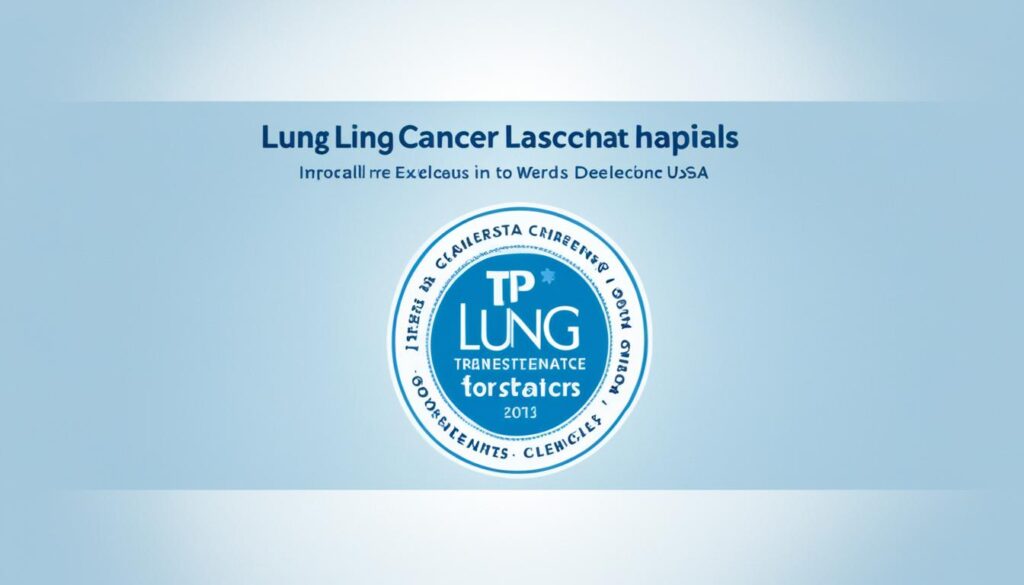Cancer Surgery : The best hospitals for lung cancer work tirelessly to stay at the forefront of advancements in medical procedures and treatments, offering cutting-edge therapies and pivotal clinical trials. Factors such as a patient’s age, geographic location, and the specific type of lung cancer they have can determine whether surgery, chemotherapy, radiation therapy, or a combination of these approaches are the best course of treatment. The criteria used to compile the list of the top hospitals for lung cancer care are centered on overall patient experience, staffing expertise, technological advancements, and the volume of patients treated for this condition.
Key Takeaways : Cancer Surgery
- Leading lung cancer hospitals offer modern treatments and clinical trials to stay at the forefront of advancements.
- Factors like age, location, and cancer type determine the most effective treatment approach for each patient.
- Criteria for top lung cancer hospitals include patient experience, staffing, technology, and patient volume.
- Minimally invasive and robotic surgeries are among the advanced treatment options available at leading cancer centers.
- Collaboration with leading research institutions enables access to the latest innovations in lung cancer care.
Importance of Advanced Lung Cancer Treatment
Lung cancer is the leading cause of cancer death worldwide, accounting for 25% of cancer deaths. Even though lung cancer occurs in 1 in 16 people, treatment options vary greatly. Factors that affect treatment for lung cancer, including age, geography, and cell type, can determine whether surgery, chemotherapy, radiation therapy, or a combination of these are best for the patient. Adding to the equation is whether the medical center in a patient’s area even has the equipment and tools needed for the latest treatment.
Personalized Treatment Options
With the advancement of cancer treatment technology, healthcare providers are now able to offer more personalized treatment options for people with cancer. By taking into account the unique characteristics of each patient’s cancer type and their overall health, doctors can create a tailored treatment plan that maximizes the effectiveness of the cancer treatment and minimizes side effects.
Technological Advancements in Lung Cancer Care
The field of lung cancer treatment has seen significant technological advancements in recent years, with the introduction of new techniques and therapies that have improved outcomes for patients. From minimally invasive surgery to targeted radiation therapy, these advancements have helped kill cancer cells more effectively while reducing the impact on healthy tissue. The availability of these advanced treatments at leading cancer centers has been crucial in the fight against advanced cancer.
Top Lung Cancer Hospitals in the United States
The best lung cancer hospitals in America are among the most advanced hospitals in the world, offering modern treatments and pivotal clinical trials. These leading institutions provide comprehensive care for patients with all types of lung cancer, utilizing the latest technologies and pioneering research to deliver exceptional outcomes.
Mayo Clinic – Renowned Lung Cancer Department
The Mayo Clinic’s lung cancer department is one of the best in the United States, offering a wide range of advanced treatment options, including highly targeted radiation therapy and minimally invasive surgery. Their team of experienced thoracic surgeons, medical oncologists, and radiation oncologists collaborate to develop personalized treatment plans that meet the unique needs of each patient.
University of Colorado Denver Hospital
The University of Colorado Denver Hospital is one of the best lung cancer hospitals in the United States because they offer a wide range of treatments and have a team of highly skilled and experienced doctors. Their comprehensive approach to cancer care includes access to cutting-edge clinical trials, state-of-the-art diagnostic tools, and a multidisciplinary team dedicated to providing the most effective and innovative therapies.
UCLA Medical Center – California Lung Treatment
The University of California Los Angeles (UCLA) Medical Center is one of the top lung cancer hospitals in the United States because of its world-renowned team of specialists who are experienced in treating all types of lung cancer. Their Lung Cancer Program utilizes the latest advancements in minimally invasive surgical techniques, targeted radiation therapy, and personalized cancer treatments to deliver exceptional outcomes for patients.
Cedars-Sinai Medical Center – California Lung Care
The Lung Cancer Program at Cedars-Sinai Medical Center in California consists of leaders in pulmonary care and research, as well as skilled thoracic surgeons. This comprehensive center offers a wide range of innovative treatment options, including robotic-assisted surgery, immunotherapy, and personalized targeted therapies, all aimed at improving outcomes for patients with advanced lung cancer.
Cleveland Clinic
Cleveland Clinic is consistently ranked as one of the best hospitals for lung cancer treatment in the United States, using the most advanced techniques and technologies to provide comprehensive care for patients with all types of lung cancer. Their multidisciplinary team of experts collaborates to develop personalized treatment plans that may include surgery, chemotherapy, radiation therapy, or a combination of these approaches.

World-Class Lung Cancer Hospitals Globally
While some of the best lung cancer treatment options are located in the United States, patients living abroad or in need of a caregiver outside the U.S. can turn to several world-class hospitals that also provide unique services and treatment methods. These global centers of excellence in lung cancer care offer cutting-edge therapies, experienced specialists, and a multidisciplinary approach to personalized patient management.
Charité – Universitätsmedizin Berlin
Charité – Universitätsmedizin Berlin in Germany is one of the most advanced hospitals in the world for lung cancer treatment, offering a wide range of treatments in a modern setting. Their team of expert oncologists, surgeons, and radiologists collaborates to deliver comprehensive, patient-centered care using the latest diagnostic and treatment technologies.
Institut Gustave Roussy
Located in Paris, France, Institut Gustave Roussy has some of the most experienced and skilled doctors and provides treatment for adults and children suffering from both rare and frequent diseases, including traditional methods and newer immunotherapy and targeted therapy options. As a leading cancer research center, Institut Gustave Roussy is at the forefront of innovative cancer treatments.
Asan Medical Center
Asan Medical Center in Seoul, South Korea employs some of Korea’s top medical professionals with decades of experience diagnosing and treating chest and lung diseases. The hospital’s advanced technologies and multidisciplinary approach ensure comprehensive and personalized cancer care for patients.
Samsung Medical Center
The Samsung Medical Center in Seoul, South Korea specializes in minimally invasive surgery and other advanced treatment and diagnostic techniques for lung cancer. Their skilled thoracic surgeons and oncologists work collaboratively to provide innovative, patient-centric cancer treatment solutions.
The Princess Margaret Cancer Centre
The Princess Margaret Cancer Centre in Toronto, Ontario is one of Canada’s best hospitals for cancer treatment and the country’s largest provider of integrated cancer research. Their team of experts delivers comprehensive, personalized care using the latest advancements in cancer diagnosis and treatment.

Cancer Surgery: Advanced Treatment Approaches
The best lung cancer hospitals offer a wide range of cutting-edge treatment options, including highly targeted radiation therapy and minimally invasive surgery. These advanced techniques are revolutionizing lung cancer care, providing patients with more effective and less-invasive alternatives to traditional surgical approaches.
Minimally Invasive Surgery
Hospitals with high surgical volumes have higher success rates and improved outcomes for lung cancer patients, including reduced post-surgical pain, shorter hospital stays, and fewer complications. For example, the thoracic surgeons at Mayo Clinic perform more than 900 minimally invasive lung operations every year, leveraging techniques like video-assisted thoracoscopic surgery (VATS) and robotic-assisted procedures to access the lungs through small incisions, rather than a large open chest incision.
Robotic Surgery
Robotic surgery is another innovative approach that is transforming lung cancer treatment. By utilizing sophisticated robotic systems, surgeons can operate with greater precision, flexibility, and control, often resulting in faster recovery times for patients. This technology allows for highly targeted tumor removal while preserving healthy lung tissue, which is critical for maintaining lung function and quality of life.
Targeted Radiation Therapy
In addition to advanced surgical techniques, the best lung cancer hospitals also offer state-of-the-art radiation therapy options. Sterotactic body radiation therapy (SBRT) and proton beam therapy are examples of highly targeted radiation approaches that can precisely deliver high doses of radiation to lung tumors while minimizing exposure to surrounding healthy tissues. These therapies are particularly beneficial for patients who may not be candidates for surgery or who have inoperable lung cancers.

Factors Influencing Lung Cancer Treatment Choice
When it comes to treating lung cancer, several key factors play a crucial role in determining the most appropriate course of action. The stage and type of the cancer, the patient’s age and overall health, as well as the availability of cutting-edge clinical trials, all contribute to shaping the treatment plan.
Cancer Stage and Type
The specific stage and type of lung cancer a patient is diagnosed with can significantly influence the treatment approach. Early-stage lung cancers may be more amenable to surgical intervention, while advanced-stage or aggressive forms may require a combination of therapies, such as chemotherapy, radiation, and targeted drug treatments. Accurately assessing the cancer’s characteristics is essential in developing an effective, personalized treatment plan.
Patient’s Age and Overall Health
A patient’s age and overall health status are also important considerations when determining the best lung cancer treatment. Younger, healthier individuals may be able to tolerate more intensive treatments, such as aggressive surgery or high-dose radiation therapy, whereas older patients or those with underlying medical conditions may require a more cautious, tailored approach to ensure their safety and well-being throughout the treatment process.
Availability of Clinical Trials
The presence of cutting-edge clinical trials offering novel therapies can be a significant factor in the treatment decision-making process. Patients may have the opportunity to access experimental treatments that could potentially provide better outcomes, particularly for those with advanced or hard-to-treat lung cancers. The availability of these trials can vary depending on the patient’s location and the resources of the healthcare facility they are being treated at.

By carefully considering these key factors, healthcare providers can develop a comprehensive, personalized treatment plan that optimizes the chances of successful outcomes for each individual lung cancer patient.
Excellence in Lung Cancer Research
The leading lung cancer hospitals in the United States and around the world are at the forefront of groundbreaking cutting-edge clinical trials and innovative research initiatives. These institutions collaborate with some of the world’s most renowned cancer research centers to develop novel treatment approaches and advance the understanding of lung cancer.
Cutting-Edge Clinical Trials
Patients treated at these premier lung cancer centers have access to the latest clinical trials, often focused on groundbreaking immunotherapies, targeted therapies, and combination treatments. These cutting-edge trials aim to kill cancer cells, contain cancer cells, and ultimately cure the cancer.
Collaboration with Leading Cancer Research Centers
The top lung cancer hospitals maintain strong research partnerships with some of the world’s most prestigious cancer research centers. This collaboration allows them to stay at the forefront of cancer treatment advancements, offering patients access to the latest clinical trials and research breakthroughs.
Multidisciplinary Approach to Lung Cancer Care
At the top lung cancer hospitals, a team of specialized oncologists, pathologists, and radiologists work together to provide comprehensive, personalized care. These facilities are renowned for their expertise in diagnosing and treating lung cancer, including advanced forms like mesothelioma and pulmonary fibrosis.
Team of Specialized Oncologists
The lung cancer care teams at these leading hospitals are composed of medical, surgical, and radiation oncologists who are among the most experienced and skilled in the country. They collaborate closely to develop individualized treatment plans that leverage the latest advancements in cancer treatment and clinical research.
Comprehensive Support Services
In addition to exceptional medical care, these lung cancer centers offer a range of supportive services to help patients and their families manage the physical, emotional, and practical challenges of the disease. This includes access to social workers, nutritionists, physical therapists, and support groups tailored to the unique needs of people with cancer.
Personalized Treatment Plans
By taking a multidisciplinary approach, the top lung cancer hospitals are able to create highly personalized treatment plans that account for the individual’s cancer type, stage, and overall health. This ensures each patient receives the most effective and appropriate cancer treatment for their unique circumstances, maximizing the chances of successful outcomes.

Access and Affordability of Lung Cancer Treatment
While the best lung cancer hospitals in the United States and globally offer cutting-edge treatments, accessing and affording these specialized services can be a significant challenge for some patients, particularly those residing in rural areas. The costs of travel, lodging, and the treatments themselves can quickly add up, creating financial barriers to receiving the high-quality cancer lung cancer care these facilities provide.
Insurance Coverage
Navigating the complexities of health insurance coverage for lung cancer treatment can be daunting. Patients must carefully review their policies to understand the extent of their coverage, co-pays, and any limitations on the type of care they can receive. Some insurance plans may not fully cover the costs of treatments offered at the top-ranked lung cancer hospitals, leaving patients responsible for significant out-of-pocket expenses.
Financial Assistance Programs
Fortunately, many lung cancer centers and non-profit organizations offer financial assistance programs to help patients cover the costs of their cancer treatment. These programs may provide grants, subsidies, or other forms of support to eligible individuals, enabling them to access the care they need without the burden of crippling medical bills. Patients should explore these options to determine if they qualify for any available financial assistance.
Legal Options for Compensation
In some cases, lung cancer patients may be eligible to seek legal compensation if their condition is the result of exposure to carcinogenic substances, such as asbestos. Lawsuits in the form of personal injury or wrongful death claims can be filed against the companies responsible for this exposure, potentially providing financial resources to help cover the costs of cancer treatment and support the patient and their family during this challenging time.
Surgery to treat cancer includes many types of cancer surgery, such as minimally invasive surgery, reconstructive surgery, and robotic surgery, aimed to remove cancer from the body. The goal of cancer surgery is to remove all of the cancer or the cancer tumor, which helps cure cancer or improve the patient’s condition.
People with cancer may have surgery to treat advanced cancer, remove a cancer that has spread, or use palliative surgery for relief. The American Cancer Society notes that surgery can also be used to diagnose cancer, look for signs of cancer, and determine the extent of cancer, which is part of the treatment plan. Different types of cancer surgery include debulking surgery, prophylactic surgery to prevent cancer, and Mohs surgery for skin cancer.
Surgery works by removing cancer cells, and staging surgery helps in planning the best treatment. Sometimes surgery is performed to remove a cancer or for preventive measures, such as in high-risk breast cancer cases with breast reconstruction surgery. Surgery for head and neck cancer, kidney cancer, and other types of cancer operations are included. Although surgery can’t always cure the cancer, it is often a crucial type of treatment, helping to improve outcomes and manage the disease.
Also Read : Academic Excellence: Ranking The Best Medical Schools In The US
Conclusion
Lung cancer remains a formidable challenge, but the advancements in cancer surgery, treatment options, and research offer hope. The leading cancer hospitals in the United States and around the world are at the forefront of delivering world-class lung cancer care, leveraging cutting-edge technologies, experienced teams, and personalized treatment approaches.
From minimally invasive surgeries and targeted radiation therapy to comprehensive support services and clinical trials, these renowned institutions are driving progress in the fight against lung cancer. Factors like cancer stage, patient age, and access to the latest treatments play crucial roles in determining the most effective course of action.
As we continue to make strides in lung cancer research and care, it is essential that patients have access to the resources and support they need. By collaborating with leading cancer centers, exploring financial assistance programs, and pursuing legal options for compensation, individuals diagnosed with lung cancer can navigate this journey with greater confidence and improved outcomes.
FAQs
Q: What are the different types of surgery used for lung cancer?
A: The main types of surgery used for lung cancer include lobectomy, pneumonectomy, segmentectomy, and wedge resection.
Q: How is surgery used to treat lung cancer?
A: Surgery is a common treatment for lung cancer where the goal is to remove the cancerous tumor and surrounding tissue to prevent the spread of the disease.
Q: What is the difference between curative and palliative surgery for lung cancer?
A: Curative surgery aims to remove all of the cancerous tissue and potentially cure the patient, while palliative surgery aims to relieve symptoms and improve quality of life for patients with advanced lung cancer.
Q: How is surgery used in the staging of lung cancer?
A: Surgery can be used to determine the stage of lung cancer by examining the tumor size, lymph node involvement, and whether the cancer has spread to other parts of the body.
Q: What supportive surgeries are available for lung cancer patients?
A: Supportive surgeries for lung cancer may include procedures to alleviate symptoms such as difficulty breathing, pain, or to improve overall quality of life for patients undergoing cancer treatment.
Q: Can surgery be used to remove all types of lung cancer?
A: Surgery may be used to remove certain types of lung cancer, depending on the size and location of the tumor, as well as the overall health of the patient.
Q: How is reconstructive surgery used in lung cancer treatment?
A: Reconstructive surgery may be performed after lung cancer surgery to restore function or appearance, such as breast reconstruction after mastectomy or chest wall reconstruction.
Source Links
- https://www.lungcancercenter.com/news/best-lung-cancer-hospitals/
- https://www.beckershospitalreview.com/rankings-and-ratings/10-best-hospitals-for-pulmonology-and-lung-surgery-us-news.html
- https://www.mayoclinic.org/departments-centers/lung-cancer-program/sections/expertise-ranking/orc-20474602





